Squarespace vs WordPress: Which Is Best for You in 2024?
Our independent research projects and impartial reviews are funded in part by affiliate commissions, at no extra cost to our readers. Learn more
Squarespace and WordPress are two website builders often distinguished for their design capabilities, making them excellent choices for creatives. Squarespace offers some of the most impeccably-designed templates in the industry, while WordPress, though not as straightforward to use, lets you have the most control over your site’s design, down to the minute detail.
Of the two, we recommend Squarespace. Its great design is only heightened by how accessible it is to use, turning even beginners into website-designing maestros. WordPress may be harder to use, but its highly specialized blogging tools and endless customization shouldn’t be overlooked either.
But which one is best for you, and why? We’ve pitted these two against each other with a full breakdown across each important category to find a definitive answer, so let’s jump in!
Who Do We Recommend Each Builder For?
| Squarespace Has the Best Building Experience | WordPress Is the Best for Blogging |
|---|---|
| If you want to build a website with the least amount of hassle and time spent, but still get fantastic results, then Squarespace is the builder for you. Its super clear drag-and-drop editor lets you customize your site in conjunction with one of Squarespace’s fantastic templates. Beginners and experts alike can create something professional-looking with it. | If you want the most amount of creative control over your website and don’t mind spending the time to achieve it, or you simply want the best blogging features available, then WordPress is the builder for you. Coding knowledge is certainly appreciated, and you’ll need to use plugins for many features, but you can get some truly amazing results with WordPress if you stick with it. |
Squarespace vs WordPress: Comparison Table
If you’re looking for a quick roundup of all the points we cover in this guide, here’s a side-by-side comparison table of WordPress and Squarespace. It weighs up the platforms in each category to help you decide which one is best for your site’s needs.
| Squarespace | WordPress | |
|---|---|---|
| Editor | The easiest to use website builder we've tested thanks to its intuitive drag-and- drop editor. You can easily build a website without knowing how to code or hiring anyone for help. | Steep learning curve, especially if you are a beginner. To get the most out of WordPress without installing a drag-and-drop builder plugin, it helps to know how to code and be technically savvy, or hire someone who is. |
| Templates | Stunning, customizable designer templates built with great user experience in mind. | A lot of choice when it comes to themes, but there are some poor quality ones to watch out for. And it helps to have some coding skills to reap the full benefits. |
| Price | Four premium plans, ranging from $16 per month to $49 per month. There is a 14-day free trial to help you get started initially. | Much more flexible pricing! WordPress itself is free, but you pay for various factors (hosting, themes, plugins, hiring help, etc.) You can find cheap options, or it could cost as much as $200 – $15,000 |
| Blogging | Good choice of blogging templates and tools to get you off the ground, but simply not as dedicated to blogging that WordPress is. | Tailored for blogging, with a wide supply of plugins and built-in features. Also has a community of bloggers, and lets you leave comments on other WordPress blogs. |
| Features and Apps | A range of in-built features with impressive quality covering a variety of areas with new features regularly added and updated – plus increased app market functionality, with the most important apps fully integrated into Squarespace already. | Smaller range of in-built features – but with thousands of plugins to choose from with endless extra functions available. |
| Selling | Built-in sales features, including great inventory size, but slightly lacking in apps and payment options. | Difficult to navigate and lacking in customer support. But if you can figure it out, it’s a powerful, customizable platform. |
| SEO | SEO features already built-in and managed for you, but with less control than WordPress. | SEO plugins like Yoast can add powerful tools and guides to your WordPress site., giving much finer control (but more management). |
You can also read our Squarespace Review and our WordPress.org Review for a more in-deth look at each platform.
Need to make a decision fast? Take our quiz to find the perfect website builder for you:
Best Editor: Squarespace
How quickly you can grasp how your website builder’s editor works can be the difference between a masterpiece and a mishap. As a creative, your website’s looks will, in the minds of visitors, reflect your actual creative prowess. It’s best practice to find a builder that can not only provide the creative customization you seek but that you can also find your way around.
In terms of the latter, Squarespace is the best option as it has the highest ease of use score in our research with 4.7 out of 5. Its aptly named Fluid Engine maps a grid over your website onto which everything from images, videos, text boxes, and sign-up forms can be placed and organized.
You can then move these elements around in whatever way you like – and better yet they keep their place when moving other elements. When we tested Squarespace ourselves, we found it difficult to make a bad site. The Fluid Engine ensures whatever elements you pick fit in aesthetically with the rest of the page.
WordPress, on the other hand, does not have a drag-and-drop editor – at least, not initially. WordPress is a CMS (content management system), meaning it is designed for the posting of regular content. As such, many of the specific website editing that could be done in seconds with Squarespace must be done with code.
With HTML code, the training wheels come off and you can edit on a far wider and more detailed level than even Squarespace can manage. However, if you are a beginner who doesn’t know code, the WordPress editor will simply seem obtuse, frustrating, and awkward. You may need to hire a professional designer if you really want a good-looking site.
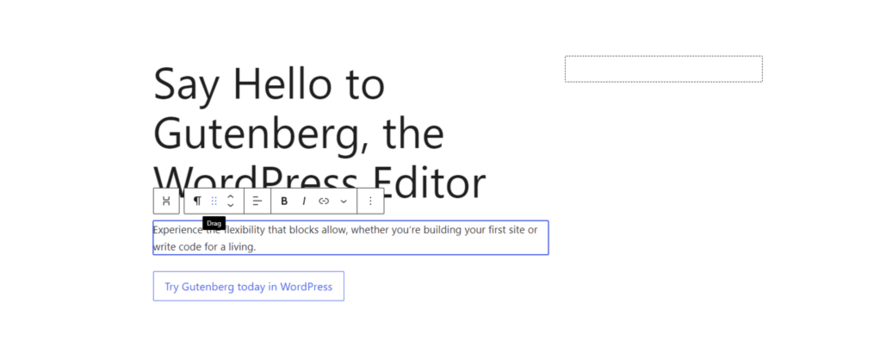
There are workarounds, however – WordPress brought a ‘block editor’, called Gutenberg, that works in a similar way to a drag-and-drop editor. There are also plugins available like Visual Composer or Elementor that you can use to build your site, though in our research Elementor only got 1.7 out of 5 for ease of use.
The Winner
Squarespace has the best building experience thanks to its superior editor
Best for Templates: Squarespace
Squarespace’s 100+ templates are renowned for their aesthetic quality, covering a range of industries from artist websites, portfolios, online stores, and blogs. Squarespace has even partnered with famous photographers for its Magnum Collection, showing that it puts the design sensibilities of its users first and foremost, making it perfect for creatives.

WordPress templates, or themes, can’t hold a candle to Squarespace’s level of dedication, which is a shame as many WordPress templates are very well designed, though you may have to pay for the better ones, with some costing a one-off payment of up to $500 while all of Squarespace’s are free to use. WordPress can also often require code to make your design stunning. It’s more work, but you get unlimited customization.
On the upside, while you can choose from hundreds of Squarespace templates, WordPress has thousands – so you’re very likely to find at least one that meets your criteria. The problem there is that not all are created equal. You will find a few good WordPress templates but probably a few duds too. Squarespace meanwhile has all its templates vetted by professionals, meaning you can always guarantee high quality.
But if you consider yourself indecisive, then Squarespace Blueprint can make you a personal template. Answer a short questionnaire and make a few design choices and Squarespace will have a full template ready for you to edit.
The Winner
Squarespace has the best-designed templates
Best for Pricing: WordPress
When you’re building on a budget it’s important to fully understand the costs involved in creating your site. Squarespace uses set pricing, giving you a good idea of how much you’ll spend over the year but locking you into at least its $16 per month plan. WordPress is free but comes with essential extra costs to run, meaning you can shop around for a lower fee as long as you’re happy to put a little more effort in.
WordPress Pricing
WordPress’ pricing is different from other website builders in that it’s not collected in one payment. WordPress itself is free, but you will need to source everything else needed to make a website an actual website, like hosting and a domain name. Squarespace on the other hand includes everything in one payment, which you pay in one pricing plan.
As a creative, you most likely have a budget you want to stick to. While Squarespace is simpler, you also don’t know what you are individually paying for. With WordPress’ approach, although it requires more work, you can keep better track of each element and adjust how much you pay as your website grows.
The most important cost for WordPress is web hosting. Without hosting, your site won’t be online. WordPress itself recommends Bluehost as a hosting provider, and we agree. It’s our best-ranked WordPress hosting provider with a score of 4.8 out of 5 in our research, providing and provides plans for websites of all sizes and even WooCommerce-specific plans. Its prices range from as cheap as $1.99 per month to $161.98 per month.
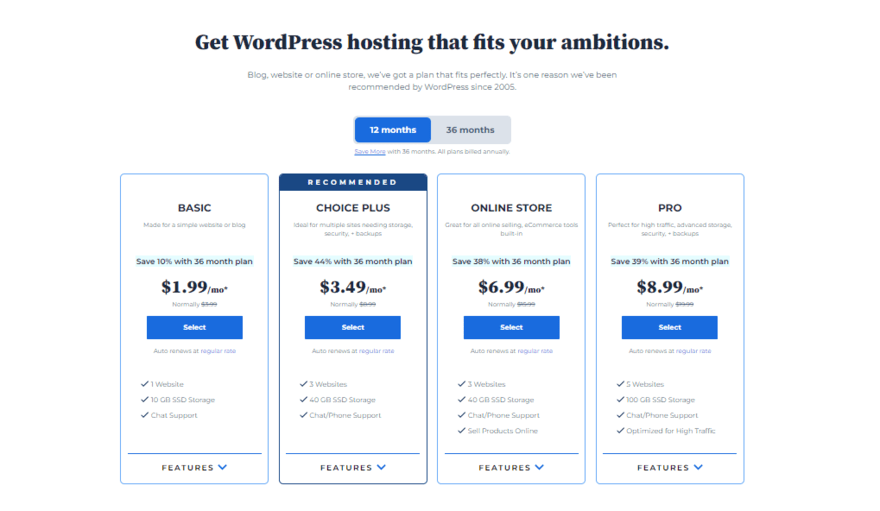
Aside from hosting, WordPress has other costs. Here’s a checklist of other expenses you might need:
- Themes: While some themes are free, for top quality, it’s worth thinking about investing in paid themes ($30-$80)
- Plugins: WordPress plugins can add all kinds of additional features to your website, from email marketing to ecommerce checkout tools ($15-$50)
- Domain names: Squarespace gives you a free domain for your first year, but with WordPress, you’ll have to purchase your own domain name from a third-party registrar like Domain.com ($10-$12 per year) or pick a hosting provider that offers a free domain for your first year (like Bluehost)
- Developer costs: If you’re building a large and/or complex website, you may even want to hire a developer, which could end up costing thousands of dollars
For creatives, we recommend the WordPress Online store plan on Bluehost for $6.99 per month. Not only do you get 40GB of storage for images but you also get the option to sell if you want, plus a free domain for a year. This plan gives you the most freedom possible and is a whole $10 cheaper than Squarespace’s cheapest plan.
Squarespace Pricing
With Squarespace’s pricing, you pay for the luxury of having to only pay one payment, with four premium pricing plans ranging from $16-49 per month (billed yearly, as you can save between 25% and 30% compared to a monthly plan).
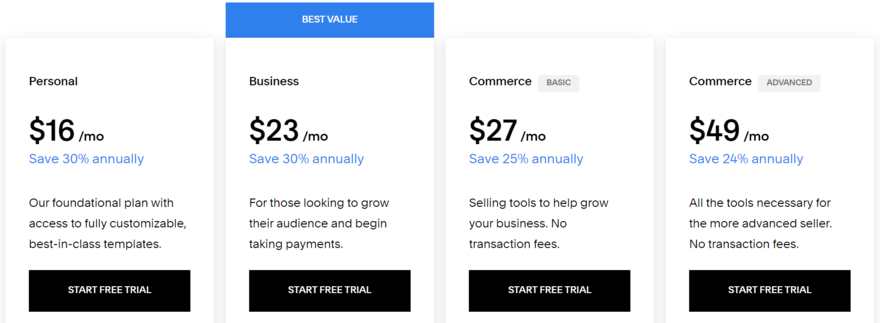
In our research, Squarespace scored the second-highest for value for money with 4.2 out of 5. All the plans provide an excellent range of features and tools for creatives, but which plan is for you all depends on your likelihood of selling. Only the Business plan and above are able to sell, meaning a minimum cost of $23 per month (billed annually). There are also transaction fees to consider, with the Business charging 3% on every transaction.
However, if you don’t plan to sell and just want a portfolio to share your art or create a blog, then the Personal plan will absolutely suit your needs. If these plans seem too expensive, Squarespace has a 14-day free trial for you to try the builder out and see if it’s a perfect fit. We’re also proud to present that our readers can get an exclusive 10% off at checkout if they use our code ‘WBE10’.
The Winner
WordPress is the best value provider
Best for Blogging: WordPress
A blog is a great way for creatives to connect to their audience, as well as offer a bit of monetization. If you are interested in finding the best blogging platform, then WordPress should certainly be in consideration. It’s a CMS that lets you create multiple blog templates, schedule hundreds of posts at a time, and have access to hundreds of blog-specific apps and plugins. You can even have multiple authors work on your site at once.
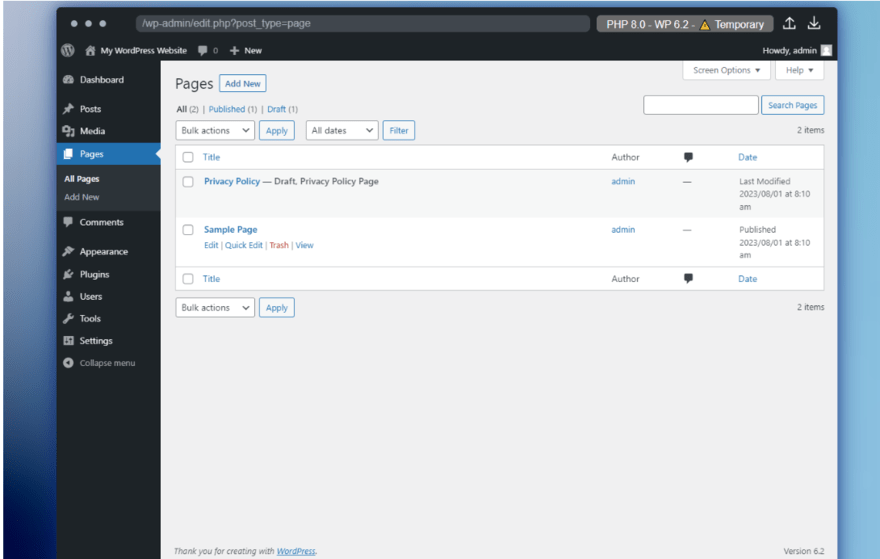
Squarespace’s blogging tools are great, but just not as heavy-duty as WordPress’s. You can still accomplish a lot, however, such as scheduling posts, having multiple authors, and even creating blog tags. Plus, in combination with Squarespace’s simple-to-use editor, it’s a much easier way to blog for beginners.
However, what really sets WordPress above the rest is its community. Anyone with a WordPress account can comment on any other WordPress blog, provided that the blogger doesn’t disable the ability. Comments help build a community and can lead to dedicated fanbases, which is what all bloggers aspire to. Since WordPress already powers nearly a third of the websites on the internet, there are plenty of WordPress accounts that might stumble upon your blog and leave a comment.
The Winner
WordPress is built for blogging
Best for Features: Squarespace
Squarespace comes with more built-in features than WordPress. These are just a few of the ones we found most useful:
- Analytics: Track website visits, traffic sources, visitor geography, and more
- Social accounts: Import content to your site from social platforms like Instagram and Twitter
- Social feeds: Embed feeds from your social accounts directly onto your site
- Podcasts: Host a podcast on your Squarespace site, and publish it to Spotify or Apple Podcasts
- AI tools: Squarespace released a host of new generative AI tools, from an AI writer to auto-generated product libraries for sellers and even hyperreal AI photo environments.
- CRM: Manage and take online bookings and schedules with new and improved customer management tools
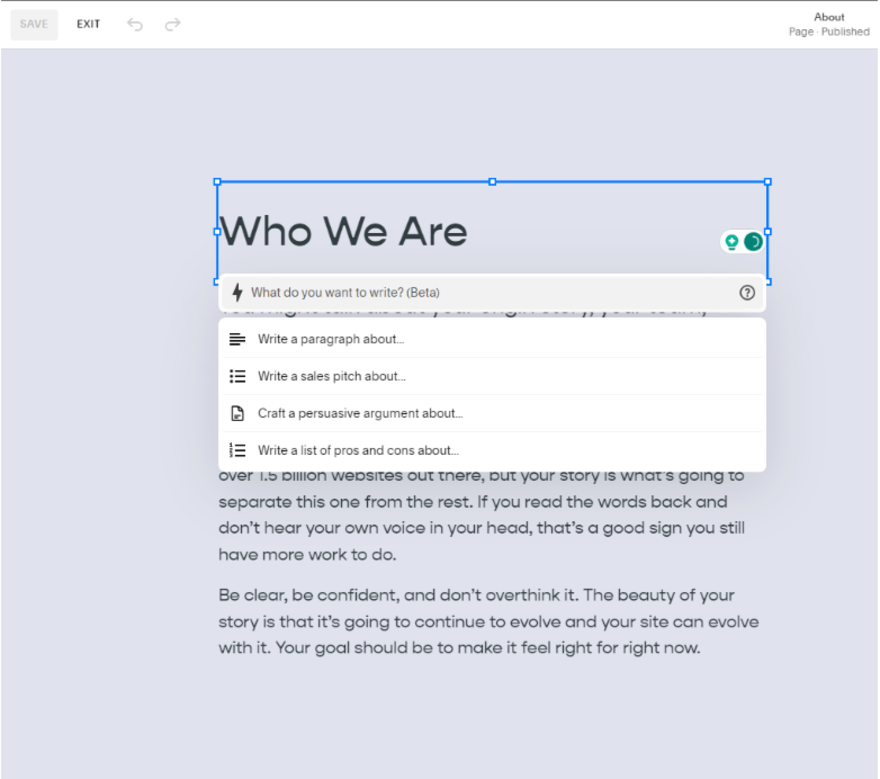
The best part about these features is that they all work with the Squarespace Fluid Engine, meaning you can simply pick them out from a menu and drag them onto your site, effortlessly combining usability and design.
WordPress is better known for its large library of plugins, and is very reliant on these integrations for adding functionality to your site. But that doesn’t mean it had no built-in features. Here are some choice features:
- Password-protected pages: You can lock certain pages with passwords, making it ideal for creatives who want member-only content
- Multiple contributors: Have different authors and admins manage your site and produce content
- Image editing tools: Edit images in WordPress, freeing up storage space and improving SEO
- Comments management: Other WordPress users can leave comments on other blogs. Reply and create a community!
- Multilingual site options (70+ languages): Make your website accessible to viewers all over the world
The Winner
Squarespace has the best in-built features
Best for Apps & Plugins: Squarespace
It’s fair to say WordPress has a plugin for everything – from SEO, ecommerce, drag-and-drop editors, and scheduling, there are over 59,000 plugins available for WordPress users to download and add to their site. The open-source nature of WordPress encourages you to download as many plugins as you need.
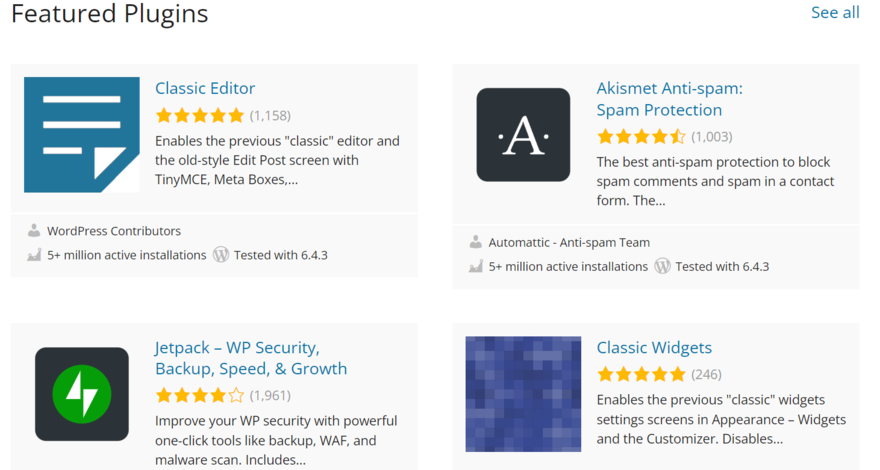
Think of it like building a Lego house from a big, mixed tub and grabbing all the bricks you find most interesting. Some of these bricks you may have to pay for, with an average WordPress subscription costing around $50-$70 per year, though some can cost much more.
Squarespace is more like a Lego set. It has all the cool bricks you need included, you just need to follow the instructions. There are qualities to both methods, but in regards to actual plugin quality, Squarespace is the winner. With 59,000 WordPress plugins to choose from, not all are going to be the best quality. In fact, we’ve covered news stories of WordPress plugins getting hacked due to vulnerabilities. To avoid risk when choosing a plugin, check the ratings to see what other users say and if it’s been updated recently, and most importantly make sure it’s compatible with the latest version of WordPress.
With Squarespace Extensions, you have a choice of 31 plugins, but each has been vetted and approved by Squarespace itself. It’s quality over quantity, and the extensions are exactly that – made to extend an already quality product further. No extension is necessary for Squarespace to work, whereas they are for WordPress.

The Winner
Squarespace has the best apps and plugins
Best for Selling: Squarespace
If you want to sell online you need certain ecommerce features, such as accepting payments and listing products, as well as guarantees around security. Squarespace offers built-in sales capabilities, although you need to choose the right plan, while WordPress relies on a plugin, such as WooCommerce. Which is right for you?
Selling on Squarespace
To sell on Squarespace, you will need to upgrade to an ecommerce plan – you can choose from the $23 per month Business plan, the $27 per month Commerce Basic plan, or the $49 per month Commerce Advanced plan. With these, you unlock a whole range of advanced ecommerce features, including:
- Unlimited inventory, orders, tax, and coupons
- Label printing
- Product listings on Instagram
- Gift cards
- Abandoned cart recovery
- Video storage
- Subscription selling
- Advanced web analytics
If your services are more appointment-based, say like a professional photographer, then Squarespace’s new Acuity Scheduling service can keep your customers up to date on when you’re available and then let them book you for gigs.
While Squarespace ecommerce certainly dazzled, earning 4.4 out of 5 for sales features in our research, there were a few things we’d like to see done better. While it has a good selection of third-party payment options, you can’t use Amazon Pay or digital wallets to accept payments. Also, compared to WordPress, the limited extensions mean you have less flexibility for niche ecommerce options like tax forms or international shipping – though Acuity is certainly a net positive for online sellers.
Selling on WordPress
With WordPress, you are going to need the ecommerce plugin WooCommerce in order to sell your work. WooCommerce is a full ecommerce platform, used by international brands like ChiaPet and Nutribullet.
WooCommerce is also free to install, making it seem the perfect platform for selling on a budget. However, as well as paying for hosting, WooCommerce is reliant on plugins for many of its sales features. On the plus side, it means you have unlimited customization to adapt your store however you want. The downside is that the costs will add up, especially for ecommerce plugins which can cost an average of $79 – $299 per year for each one.
There are also only three free themes on the WooCommerce marketplace. A paid theme can cost anywhere from $39 – $79 per year.
The Winner
Squarespace has the best sales features
Best for SEO: Tie!
Both Squarespace and WordPress have access to a fantastic range of SEO tools, such as:
- Customizable meta titles and descriptions: These are the titles and paragraphs that describe a page in Google search results.
- Customizable URLs: You can clean up your URLs to make them more readable to search engines (for example, squarespace.com/pricing is a clean and simple URL!)
- Image alt text: Alt text just describes what an image is showing, and it makes your website more accessible because anyone using a screen reading tool won’t have to wonder what each image shows. Alt text also helps search engines understand the purpose and relevance of each image.
- Page redirects: If you change a page’s URL and someone tries to visit the old one, Squarespace will let you automatically send them to the new one!
- Automatic sitemaps: A sitemap is a list of the different pages on your site, designed to help search engines figure out how they’re all related. Squarespace generates one of these for you automatically.
- Hide a page: If you don’t want a certain page to show up on search engines just yet, you can simply hide the page from Google!
- Control social image: You can control which image appears alongside your content when someone shares it on social media.
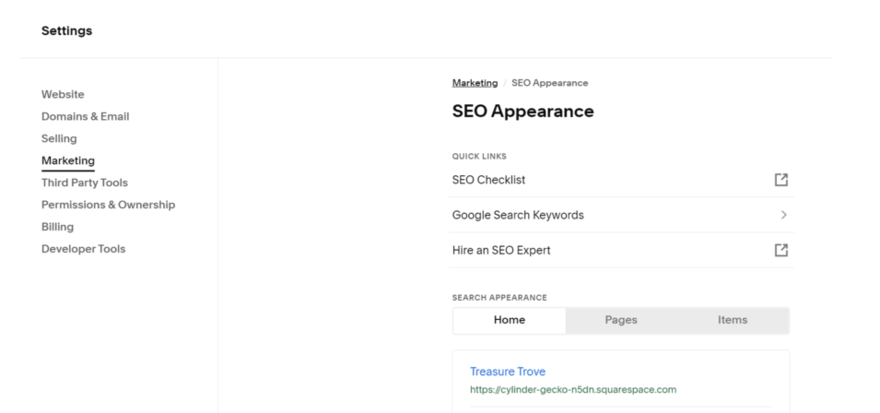
The major difference between the two is that Squarespace’s SEO features are all built-in, while WordPress relies on the plugin Yoast. While Yoast is powerful, WordPress can have greater control over SEO thanks to a hosting provider. Hosting gives you more control over your site’s technical details, such as deciding how much storage to assign to your site, which affects your loading speed – an important factor for SEO.
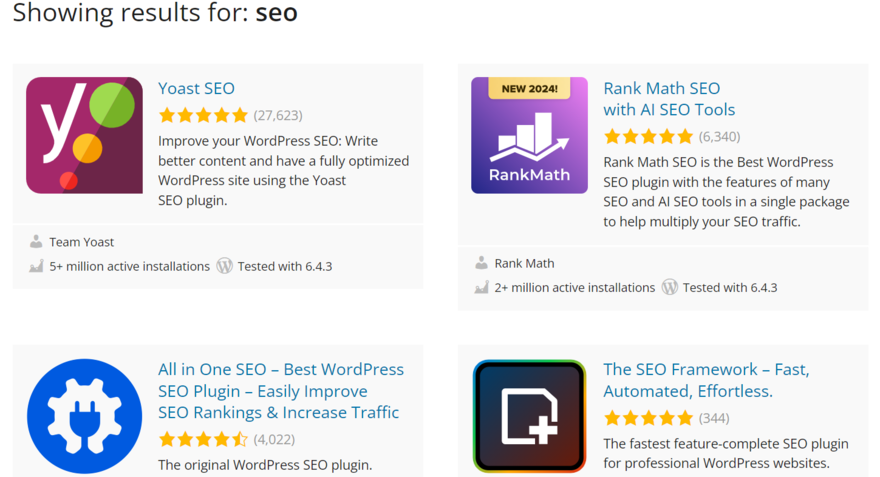
With Squarespace, you won’t be able to change technical SEO factors like you can with WordPress and Yoast, but you do get a lot of the work taken care of automatically, meaning less work and more time to spend on other areas.
The Winner
Both Squarespace and WordPress have equally good SEO tools
How We Test
When we pit two website builders against each other, we make it a top priority that all the information about each builder is as accurate as possible by testing them against our website builder research methodology. Not only do we have researchers, but our writers have hands-on experience with all our builders, creating their own websites and getting to grips with every category we cover.
For this article, we took special care to consider who was the primary customer for each builder. As they both have deeper creative and customization tools than other competitors, we focused this article on what creatives look for in builders, taking care to cover blogging and SEO due to their importance to the reader.
Squarespace vs WordPress: Summary
Overall, Squarespace is the winner of this head-to-head. Its superior editor and built-in features simply mean it’s more recommendable than WordPress – even for those with website-creating experience. If you want an enjoyable building experience alongside a great-looking website, Squarespace is the builder you need.
WordPress, with its complicated editor and open-source nature, can certainly be trickier to get used to. But if you want the best blogging capabilities and Squarespace didn’t scratch your customization itch deep enough, WordPress could be for you. It’s also cheaper on the whole than Squarespace, even if it requires a bit more setup.
If you want a deeper look at both these builders, check out our full Squarespace Review and WordPress.org Review for more.


395 comments